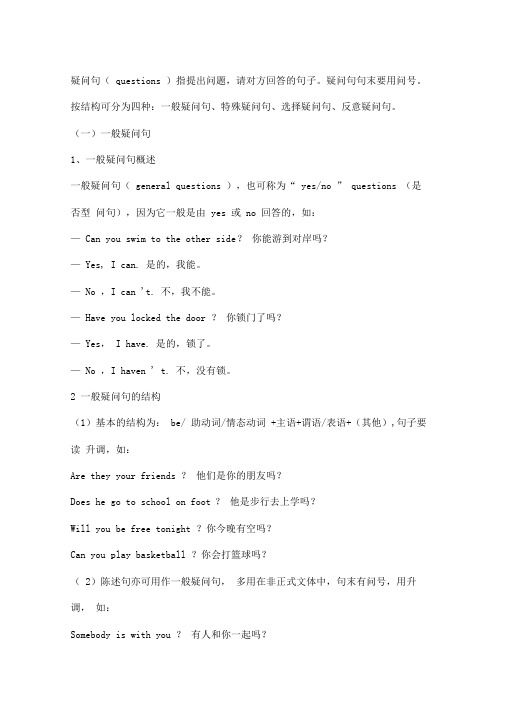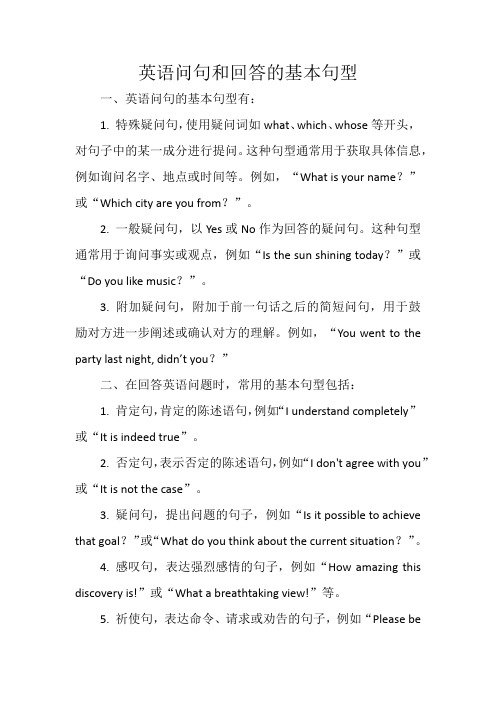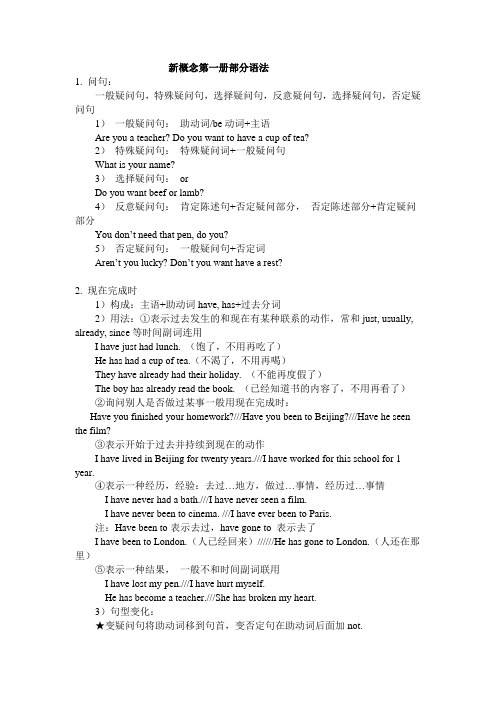一般疑问句和特殊疑问句等句型联系
英语一般疑问句和特殊疑问句知识精讲

英语一般疑问句和特殊疑问句知识精讲疑问句可再分为一般疑问(General question)和特殊疑问(Special question)两种。
1.一般疑问:用be或助动词或情态动词置于句首,并以“Yes,…”,或“No,…”或相当于yes / no回答的问句称为一般疑问句.2.含系动词be的一般疑问句的构成具体地说,am 只能跟在第一人称的单数 I 后面,are 搭配 you, 不管是单数还是复数,is 跟在第三人称单数 he, she 后面,be 动词的基本意思:是如:I'm in Class 2, Grade 1. →Are you in Class 2, Grade 1? 你是在一年级二班吗?(如遇第一人称,最好将其置换成第二人称)It's a map of China. →Is it a map of China? 这是一幅中国地图吗?be 或have(有)置于句首来表达疑问,例:Am I wrong again? (我又错了?)Yes, you are (wrong again). (是的,你又错了。
)No, you aren’t. (不,你没错。
)Is it your bicycle? (这辆自行车是你的吗?)Yes, it is. (是的,是我的。
)No, it isn’t. (不,那不是我的。
)Were there many people at her birthday party?(她的生日宴会来了很多人吗?)Yes, there were. (是的,来了很多人。
)No, there weren’t. (没有,没有很多人。
)Have you money with you? (你身上带钱了吗?)(=Do you have money with you?—美语)Yes, I have.(Yes, I do.—美语)(有,我带钱了。
)No, I have no money with me. (No, I don’t.—美语)(没有,我没带钱。
一般疑问句和特殊疑问句等句型联系上课讲义

一般疑问句和特殊疑问句等句型联系一般疑问句和特殊疑问句一、一般疑问句be动词(am, is are)肯定:Yes, 主语+引导词引导词 can/will/should等情态动词答语do/does/did助动词否定:No, 主语+引导词+not二、特殊疑问句(即由特殊疑问词引导的疑问句)特殊疑问词有:when, where, who, what, whose, why, howbe动词(am, is are)特殊疑问词+ can/will/should等情态动词 + 主语 + 谓语 + 其他 do/does/did助动词改写否定句型be动词 + notcan/will/should等情态动词 + not主语 + do/does/did + not + 谓语动词感叹句的表述What + a/an + 形容词 + 名词例:What an interesting film!How + 形容词 + 主语 + 谓语例:How interesting the film is!补充知识点动词原形如:buy(买)1、be going to + 地点如:the park打算 ... 时间如:on Monday2、want to + 动词原形表示“想要...”3、在......转弯用介词“at”, 如turn left at.../turn right at4、like + V-ing, 如:He likes playing basketball.5、by + 交通工具,表示交通方式。
6、go to + 地点,表示“去...”; get to + 地点,表示“到...”7、next to 挨着;near 在...附近; in front of... 在...前面;behind... 在...后面8、be far from... 离...远的句型转换练习题一、改成一般疑问句1、He is a student.2、She can dance.3、You like apples.二、改成否定句1、He is a student.2、She can dance.3、You like apples.三、对划线部分提问1、He goes to school by bus.2、He is a coach.3、The hospital is near the bookstore.4、I am going to the cinema tomorrow.四、改成感叹句1、The cinema is great.2、The girl is beautiful.补充实义动词动词单三形式将括号里动词的适当形式填入横线上。
一般疑问句、特殊疑问句、选择疑问句、反义疑问句地详细用法

疑问句( questions )指提出问题,请对方回答的句子。
疑问句句末要用问号。
按结构可分为四种:一般疑问句、特殊疑问句、选择疑问句、反意疑问句。
(一)一般疑问句1、一般疑问句概述一般疑问句( general questions ),也可称为“ yes/no ” questions (是否型问句),因为它一般是由 yes 或 no 回答的,如:— Can you swim to the other side ?你能游到对岸吗?— Yes, I can. 是的,我能。
— No ,I can 't. 不,我不能。
— Have you locked the door ?你锁门了吗?— Yes, I have. 是的,锁了。
— No ,I haven ' t. 不,没有锁。
2 一般疑问句的结构(1)基本的结构为: be/ 助动词/情态动词 +主语+谓语/表语+(其他),句子要读升调,如:Are they your friends ?他们是你的朋友吗?Does he go to school on foot ?他是步行去上学吗?Will you be free tonight ?你今晚有空吗?Can you play basketball ?你会打篮球吗?( 2)陈述句亦可用作一般疑问句,多用在非正式文体中,句末有问号,用升调,如:Somebody is with you ?有人和你一起吗?He didn ' t finish the work ?他没有做完活吗?You are fresh from America , I suppose ?我猜,你刚从美国回来吧?3、一般疑问句的答语( 1)一般疑问句一般由 yes 或 no 来回答,如:— Are you tired ?你累了吗?— Yes,I am. 是的 ,累了。
— No, I ' m not. 不,不累。
— Does she do the cleaning ?她扫除了吗?— Yes , she does. 是的,她打扫了。
英语问句的基本句型和回答

英语问句和回答的基本句型一、英语问句的基本句型有:1. 特殊疑问句,使用疑问词如what、which、whose等开头,对句子中的某一成分进行提问。
这种句型通常用于获取具体信息,例如询问名字、地点或时间等。
例如,“What is your name?”或“Which city are you from?”。
2. 一般疑问句,以Yes或No作为回答的疑问句。
这种句型通常用于询问事实或观点,例如“Is the sun shining today?”或“Do you like music?”。
3. 附加疑问句,附加于前一句话之后的简短问句,用于鼓励对方进一步阐述或确认对方的理解。
例如,“You went to the party last night, didn’t you?”二、在回答英语问题时,常用的基本句型包括:1. 肯定句,肯定的陈述语句,例如“I understand completely”或“It is indeed true”。
2. 否定句,表示否定的陈述语句,例如“I don't agree with you”或“It is not the case”。
3. 疑问句,提出问题的句子,例如“Is it possible to achieve that goal?”或“What do you think about the current situation?”。
4. 感叹句,表达强烈感情的句子,例如“How amazing this discovery is!”或“What a breathtaking view!”等。
5. 祈使句,表达命令、请求或劝告的句子,例如“Please beseated”或“Don't hesitate to ask for help if you need it”。
在回答问题时,除了使用以上基本句型外,还可以根据具体情况使用适当的形容词、副词或介词短语等来丰富回答的内容。
小学英语四种基本句型肯定句、否定句、一般疑问句与特殊疑问句

shoes? 表示物:They are white sheep. What are they?
表示颜色:They are white sheep. What color are these
sheep? 5、 名词所有格和人
表示名词所有格:She’s Lucy’s sister. Whose sister is
小学英语四种基本句型-肯定 句、否定句、一般疑问句与特殊 疑问句
肯定句、否定句、一般疑问句和特殊疑问句的详解
一、肯定句、否定句、一般疑问句和特殊疑问句定义 1.肯定句:表示肯定的意思, 即不含有否定词“不”。
我是一个学生 I am a student. 他去上学 He goes to school. 2.否定句:表示否定的意思。 我不是一个男孩。 I am not a boy 他不去上学 He does not go to school. 3. 一般疑问句:回答为“是 yes”或者“否 no”的问句。 你是一个学生吗? Are you a student? 你喜欢英语吗? Do you like English? 4. 特殊疑问句:回答不是“是 yes”或者“否 no”的问句,根据提问内容具体回答。 现在几点了? What’s the time? 哪一支笔是你的? Which is your pen?
2.就划线部分提问(变特殊疑问句)
I like English. 第一步:先变一般疑问句 Do you like English?
第二步:找合适的特殊疑问词代替划线部分 Do you like what?
第三步:特殊疑问词提前放到句首,并大写,其余按顺序照抄,省略划线部分。
What do you like?
没有 am, is, are 的句子 肯定句变否定句:在主语后面加上 do not 或者 does not,其余按顺序照抄动词用原形 肯定句变一般疑问句:在句首加 do 或者 does 并大写,其余照抄。注意:动词用原形 肯定句变特殊疑问句(就划线部分提问):分 3 步骤 第一步:先变一般疑问句 第二步:找合适的特殊疑问词代替划线部分(划线部分不能在特殊疑问句中出现) 第三步:特殊疑问词提前放到句首,并大写,其余按顺序照抄,省略划线部分。
英语疑问句型结构大全

英语疑问句型结构大全疑问句也有四种类型,它们分别是一般疑问句、特殊疑问句、选择疑问句和反义疑问句。
这些疑问句的结构分别如下:1、一般疑问句结构:情态动词/be动词/助动词+主语+其它?例句:Can you speak English?译文:你会说英语吗?解析:can是情态动词,you是主语,speak English是其它。
例句:Are you her English teacher?译文:你是她的英语老师吗?解析:are是be动词,you是主语,her English teacher是其它。
例句:Does he like playing football?译文:他喜欢踢足球吗?解析:does是助动词,he是主语,like playing football是其它。
2、特殊疑问句结构:疑问词+情态动词/be动词/助动词+主语+其它?例句:How can I learn English well?译文:我怎样才能学好英语?解析:how是疑问词,can是情态动词,I是主语,learn English well是其它。
例句:Where is Mike from?译文:迈克来自哪里?解析:where是疑问词,is是be动词,Mike是主语,from是其它。
例句:When will she go to the park with you?译文:她什么时候要和你去公园?解析:when是疑问词,will是助动词,she是主语,go to the park with you是其它。
3、选择疑问句结构:一般疑问句/特殊疑问句+选项A+or+选项B?例句:Is she a teacher or a student?译文:她是一名老师还是一名学生?解析:结构为一般疑问句+两个选项。
例句:Which pen do you want to buy, the blue one or the red one?译文:你想买哪支钢笔,蓝色的还是红色的?解析:结构为特殊疑问句+两个选项。
小学英语四种基本句型-肯定句、否定句、一般疑问句与特殊疑问句

练一练 2:
1、 It’s a book. (改一般疑问句)
2、 My father is in the study. (对划线部分提问)
3、 Do you watch TV every Sunday (做肯定回答)
4、 This picture is very beautiful. (改为以 what 引导的感叹句)
第 3 页,共 12 页
特殊:
等强烈情感
What a nice pencil case!
变为 any There are some birds in the tree.→There aren't any birds in the tree. 但是,若在表示请邀请、请求的句子中,some 可以不变。 Would you like some orange juice 与此相关的一些不定代词如 something, somebody 等也要进行相应变化。
1、A: _______ is the boy in blue B:He’s Mike.
2、A: _______ wallet is it
B:It’s mine.
3、A: _______ is the diary
B:It’s under the chair.
4、A: _______ is the Chirstmas Day B: It’s on the 25th of December.
1.肯定句、否定句和一般疑问句的互换
非单三 肯定句:I like English.
一般疑问句:Do you like English
否定句:I do not like English.
单三
肯定句:He likes English.
新概念第一册部分语法及相关练习题

新概念第一册部分语法1. 问句:一般疑问句,特殊疑问句,选择疑问句,反意疑问句,选择疑问句,否定疑问句1)一般疑问句:助动词/be动词+主语Are you a teacher? Do you want to have a cup of tea?2)特殊疑问句:特殊疑问词+一般疑问句What is your name?3)选择疑问句:orDo you want beef or lamb?4)反意疑问句:肯定陈述句+否定疑问部分,否定陈述部分+肯定疑问部分You don’t need that pen, do you?5)否定疑问句:一般疑问句+否定词Aren’t you lucky? Don’t you want have a rest?2. 现在完成时1)构成:主语+助动词have, has+过去分词2)用法:①表示过去发生的和现在有某种联系的动作,常和just, usually, already, since等时间副词连用I have just had lunch. (饱了,不用再吃了)He has had a cup of tea.(不渴了,不用再喝)They have already had their holiday. (不能再度假了)The boy has already read the book. (已经知道书的内容了,不用再看了)②询问别人是否做过某事一般用现在完成时:Have you finished your homework?///Have you been to Beijing?///Have he seen the film?③表示开始于过去并持续到现在的动作I have lived in Beijing for twenty years.///I have worked for this school for 1 year.④表示一种经历,经验:去过…地方,做过…事情,经历过…事情I have never had a bath.///I have never seen a film.I have never been to cinema. ///I have ever been to Paris.注:Have been to表示去过,have gone to 表示去了I have been to London.(人已经回来)//////He has gone to London.(人还在那里)⑤表示一种结果,一般不和时间副词联用I have lost my pen.///I have hurt myself.He has become a teacher.///She has broken my heart.3)句型变化:★变疑问句将助动词移到句首,变否定句在助动词后面加not.e.g. Have you lost your pen? I have not lost my pen.★肯定回答及否定回答:Yes, I have. No, I have not.★特殊疑问句:What have you done? /// What has he done?一般过去时与现在完成时的区别:凡是有明确的表示过去的时间状语的句子为过去时3. 过去完成时:1)用法:在过去的时间里,两个动作中,发生在前的哪个动作要用过去完成时。
- 1、下载文档前请自行甄别文档内容的完整性,平台不提供额外的编辑、内容补充、找答案等附加服务。
- 2、"仅部分预览"的文档,不可在线预览部分如存在完整性等问题,可反馈申请退款(可完整预览的文档不适用该条件!)。
- 3、如文档侵犯您的权益,请联系客服反馈,我们会尽快为您处理(人工客服工作时间:9:00-18:30)。
一般疑问句和特殊疑问句
一、一般疑问句
be动词(am, is are)
肯定:Yes, 主语+引导词
引导词can/will/should等情态动词答语
do/does/did助动词否定:No, 主语+引导词+not
二、特殊疑问句(即由特殊疑问词引导的疑问句)
特殊疑问词有:when, where, who, what, whose, why, how
be动词(am, is are)
特殊疑问词+ can/will/should等情态动词+ 主语+ 谓语+ 其他
do/does/did助动词
改写否定句型
be动词+ not
can/will/should等情态动词+ not
主语+ do/does/did + not + 谓语动词
感叹句的表述
What + a/an + 形容词+ 名词例:What an interesting film!
How + 形容词+ 主语+ 谓语例:How interesting the film is!
补充知识点
动词原形如:buy(买)
1、be going to + 地点如:the park
打算... 时间如:on Monday
2、want to + 动词原形表示“想要...”
3、在......转弯用介词“at”, 如turn left at.../turn right at
4、like + V-ing, 如:He likes playing basketball.
5、by + 交通工具,表示交通方式。
6、go to + 地点,表示“去...”; get to + 地点,表示“到...”
7、next to 挨着;near 在...附近; in front of... 在...前面;behind... 在...后面
8、be far from... 离...远的
句型转换练习题
一、改成一般疑问句
1、He is a student.
2、She can dance.
3、You like apples.
二、改成否定句
1、He is a student.
2、She can dance.
3、You like apples.
三、对划线部分提问
1、He goes to school by bus.
2、He is a coach.
3、The hospital is near the bookstore.
4、I am going to the cinema tomorrow.
四、改成感叹句
1、The cinema is great.
2、The girl is beautiful.
补充实义动词动词单三形式
将括号里动词的适当形式填入横线上。
1. I ________ in the corridors. (walk)
2. He _________ in the corridors. (run)
3. She ___________ her face once a day. (wash)
4. They ____________ their teeth once a day. (brush)
5. You ___________ up your clothes once a day. (hang)
6. We ____________ our home work once a day. (finish)
7. He ____________ rubbish in the classroom. (throw)
8. She _____________ rubbish on the floor. (throw)
9. I _____________ rubbish in the bin. (throw)
二、将括号里动词的适当形式填入横线上。
1. I ________ in the corridors. (walk)
2. He _________ in the corridors. (run)
3. She ___________ her face once a day. (wash)
4. They ____________ their teeth once a day. (brush)
5. You ___________ up your clothes once a day. (hang)
6. We ____________ our home work once a day. (finish)
7. He ____________ rubbish in the classroom. (throw)
8. She _____________ rubbish on the floor. (throw)
9. I _____________ rubbish in the bin. (throw)
10. They ___________ the table once a day. (set)。
